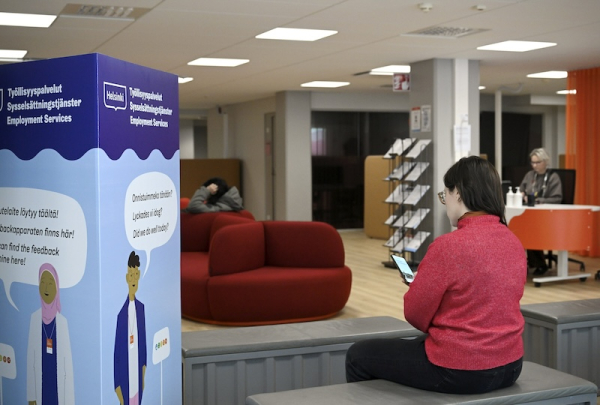
A customer waits for their turn at the Helsinki employment services office. Photo: Markku Ulander / Lehtikuva
- Next Article Prosecutor: police fired multiple shots in fatal Helsinki rooftop incident
The average unemployment duration in Finland has reached an all-time high of 70 weeks, according to official figures recorded in May. This is the longest period since national tracking began in 2007.
The latest data reveals a growing divide by age. Young adults aged 20–24 remain unemployed for an average of 34 weeks. Those aged 60–64 now face job searches that stretch beyond 100 weeks.
The number of people unemployed for over two years has climbed to its highest level since 2016. The share of people out of work for more than five years is also at a record level.
Sonja Gustafsson, an engineer and Master of Business Administration, has been unemployed since being laid off in spring 2024. She previously worked in Brussels and held managerial roles in Finland. Since her redundancy, she has struggled to secure any new role.
“Before my unemployment, I was offered a couple of managerial positions,” she said. “But now, nothing has come through.”
She is now applying for jobs abroad.
“Having lived outside Finland before and knowing several languages, it might just be that my next job isn’t in Finland.”
She criticised recent policy reforms that removed the exempt income allowance. This allowance previously allowed unemployed people to earn modest amounts without reductions to their unemployment benefits.
“Now there’s no point in doing small freelance jobs. The system doesn’t support people who are trying to get by in a difficult situation,” she said. “This idea of incentives isn’t really working.”
Antti Ilvonen, Senior Analyst at Danske Bank, said the figures reflect a weak labour market rather than a lack of motivation among workers.
“There are fewer new spells of unemployment than a year ago, but people are staying unemployed longer. There just aren’t enough job openings,” he told Yle.
He said that the ratio of job vacancies to jobseekers is the lowest it has been since the global financial crisis.
“The situation is reminiscent of the post-euro crisis years,” he said.
Ilvonen pointed to a lag between economic growth and labour market recovery.
“Consumer confidence surveys show small signs of a slight strengthening of confidence in the improving economic situation early in the year,” he said.
He also warned that prolonged unemployment could have wider economic effects.
“When people fear their unemployment will drag on, they spend less and save more, which in turn slows the recovery.”
Despite government efforts to tighten incentives for jobseekers, Ilvonen said these policies are ineffective in the current conditions.
“Right now, the problem isn’t a lack of willingness to work. The problem is that there just aren’t any jobs.”
Kalle Mäkinen, a jobseeker with over two decades of experience in start-ups and corporate projects, is also feeling the impact.
“I have been actively looking for a job, as actively as is reasonable at the moment. There are very few jobs available, so you could say that the bazaar has pretty much run out of fruit,” he told Yle.
Mäkinen is now developing a business idea while continuing his job search.
“On LinkedIn, it’s easy to see that some jobs hit 100 applicants quickly — and that’s just the visible number,” he said.
He attributed employer reluctance to economic uncertainty.
“Many companies are still waiting before investing or hiring. We need more signals that encourage risk-taking.”
Mäkinen is hopeful about new opportunities in the tech and start-up sectors but called for stronger leadership.
“The government and central bank need to focus on restoring confidence. That’s what will kickstart investment and hiring again.”
HT
- Next Article Prosecutor: police fired multiple shots in fatal Helsinki rooftop incident
Source: www.helsinkitimes.fi
